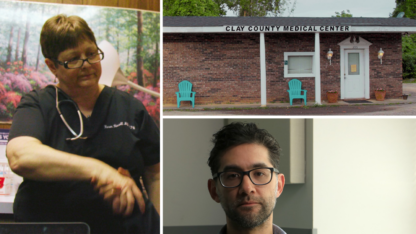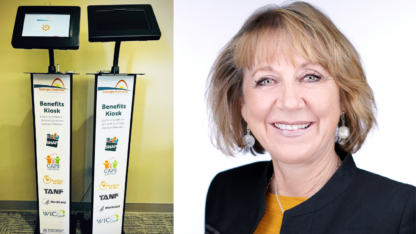A new commission will soon begin examining the health care coverage needs of low-income and uninsured Georgians, kicking off an examination that is expected to delve into whether the state should rethink its long-held resistance to fully expanding Medicaid.
That panel was created earlier this year after some high-ranking Republicans showed a new openness toward expanding health care coverage through an alternative to traditional Medicaid expansion.
But a proposal to expand health care coverage using an Arkansas-style model, which purchases private insurance on the marketplace instead of adding more people to the state-run Medicaid program, was narrowly defeated after emerging late in the session.
The newly created commission was seen as a way to continue that conversation while giving Gov. Brian Kemp’s limited expansion program, Georgia Pathways to Coverage, more time to work.
The nine-member commission is set to hold its first meeting later this month and is tasked with issuing a report to the governor and state lawmakers this December ahead of the 2025 legislative session. The commission is set to dissolve at the end of 2026.
A proposed temporary federal work-around
There is also a new proposal in the works that would create a temporary federal work-around for non-expansion states like Georgia.
A similar concept was floated a couple years ago during negotiations over the Inflation Reduction Act, but that earlier proposal threatened to reduce the federal funding of holdout states.
Georgia, which has one of the highest uninsured rates in the country, is one of 10 states that have not fully expanded Medicaid under the Affordable Care Act.
Sen. Raphael Warnock announced Thursday that he would introduce a bill called the “Bridge to Medicaid” Act in hopes of building support ahead of the expected push next year to extend the Trump-era tax cuts. Sen. Jon Ossoff is also a sponsor.
The proposal would use tax credits to create a new health care option for the hundreds of thousands of Georgians who are in what is known as the coverage gap, which exists in states that did not fully expand Medicaid.
The program would start in 2026 and last for three years.
“Those tax cuts went by and large to the wealthiest of the wealthy,” Warnock said in an interview. “While we’re having a conversation about tax cuts for people who don’t need them, I think we certainly ought to be talking about how to provide tax incentives that will provide health care to a traveling nurse, a truck driver, somebody who paints houses for a living.
“These are these ordinary people who keep the American economy going, and our failure to do something about these millions of Americans who are in the Medicaid gap means that we have a sicker and weaker workforce,” he said.
If passed, these new tax credits would be like existing subsidies but would be expanded to include more people and would be more generous in that they would apply to copays and deductibles.
The program is similar to the expansion model Republican state lawmakers in Georgia have been eyeing, said Leah Chan, director of health justice at the Georgia Budget and Policy Institute.
“It would give us an opportunity to test out that idea and then see what works and doesn’t work and then after the three years is over, transition to whatever plan to close the coverage gap works best for Georgia,” Chan said. “So the three years could just give us an opportunity to test out this idea of leveraging this sort of premium assistance model to close the coverage gap.”
GBPI is among the groups that have come out in support of Warnock’s federal work-around proposal. The American Cancer Society Cancer Action Network, which has pushed for full Medication expansion at the state level, is another group.
“Closing the coverage gap would give access to lifesaving screenings and primary care to more than 400,000 uninsured Georgians so they can be more likely to detect cancer at earlier stages and increase chances of survival,” Fabienne Antoine-Nasser, who is the organization’s Georgia government relations director, said in a statement Friday.
Still, Warnock said his proposal is meant to serve as a stopgap solution.
“This is only a three-year program. So, at the end of those three years, our state leaders will have to decide if they think people should continue to be able to have health insurance, and the way to give them health insurance would be to expand,” Warnock said.
‘More work to do’
Under Kemp, the state has partially expanded coverage for some low-income Georgians who complete 80 hours of work, school or other qualifying activity each month.
As of June, about 4,300 people were enrolled, according to GBPI, which is tracking enrollment through public records requests. When the program launched a year ago, state officials were planning for as many as 100,000 people to sign up and said that as many as 345,000 people could be eligible.
The governor defended his limited expansion program and blasted traditional Medicaid as an “ineffective bureaucracy” during a speech Thursday at the Georgia Hospital Association’s annual meeting, according to a copy of his prepared remarks.
Kemp has blamed the Biden administration for Pathways’ slow start. The program was delayed after the federal government objected to the program’s work requirement, but a federal judge sided with the state.
The Kemp administration sued the federal government again in February in an attempt to reclaim the time lost, and that lawsuit is still pending. For now, the state’s program is set to expire in September of 2025.
The program started up last summer as all states were going through the process of assessing the eligibility of all 2.7 million people on Medicaid as part of the end of a pandemic-era federal policy, known as the unwinding.
Kemp told the state’s hospital leaders Thursday that kicking off the program amid such a massive undertaking stretched the state’s resources and prevented “Pathways from receiving the launch it should have had.”
He argued that full Medicaid expansion is “not the best path forward” and pledged to continue to roll out a “Georgia-specific approach to health care that will help those in need get care while they pursue greater opportunities.”
“Do we have more work to do? Absolutely,” Kemp said. “But we remain committed to building on the progress we’ve made and fighting back against efforts that threaten to send us backwards.”
What that work ahead will look like is about to take center stage.
Kemp appointed GHA President and CEO Caylee Noggle to serve as the commission’s chairperson. Noggle oversaw the launch of Pathways when she served as commissioner of the state’s Department of Community Health.
“We are excited to continue working on improving health care in Georgia with (the governor) and while we understand his approach, we remain encouraged by his comments recognizing we have more work to do,” Noggle said in a statement Friday in response to Kemp’s comments at the GHA conference.
This story was provided by WABE content partner the Georgia Recorder.








